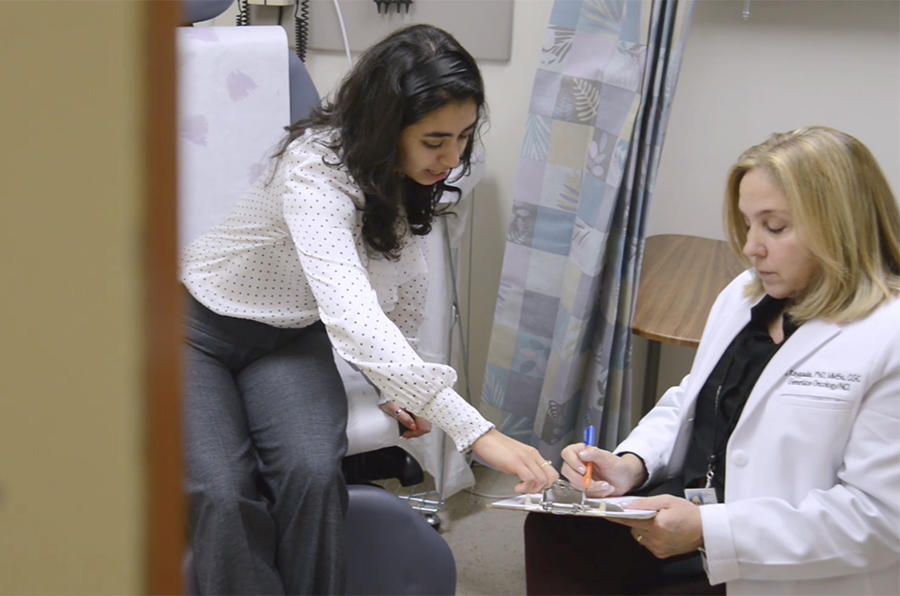Genetic Counselor Helps Patients Understand Cancer Care
, by Brittany Cordeiro, NCI-CONNECT Program Manager
Dr. Margarita Raygada helps brain and spine tumor patients understand what genetic testing means for their care and family cancer risk—and what it means for research.
The diagnosis of a rare brain or spine tumor can be overwhelming. Patients not only worry about their own health, but the health of their family. Most cancer patients fear their cancer is hereditary or could be passed to their family.
“While very few central nervous system cancers are hereditary, all are caused by genetic changes,” says Margarita Raygada, Ph.D., oncology genetic counselor and geneticist at NCI. She helps patients understand what genetic testing means for their care and family cancer risk, and what it means for research. Studying changes in cancer genes helps researchers develop treatments and improve care.
“The importance of genetic testing and hereditary syndromes is mostly overlooked in neuro-oncology clinics because patients have more concerning issues,” Dr. Raygada says. NCI-CONNECT offers patients with rare brain and spine tumors a comprehensive genetic counseling evaluation that includes genetic testing free-of-charge.
“My intervention is medical and psychosocial. I am taking genetic test results paired with my evaluations and educating patients,” Dr. Raygada says. She received a doctorate in medical science and molecular biology at the Uniformed Services University of the Health Sciences in Bethesda, Maryland, a master’s in human genetics and genetic counseling at MedStar Georgetown University Hospital (GUH) in Washington, D.C., and held two postdoctoral fellowships in molecular biology at The Johns Hopkins Hospital in Baltimore and cancer genetics at GUH, respectively. She joined NIH in 2000 and NCI in 2017.
“I have always been fascinated by the way genes affect health,” Dr. Raygada says. When she meets patients, she discusses their personal and family medical history and a management plan for cancer screenings, prevention, and risk-reduction. “It is very rewarding to be able to help patients be proactive and feel better about their care.”
What to Know About Genetic Testing
Genetic testing is a type of medical test that identifies changes in chromosomes, genes, or proteins. There are many different types of genetic tests that are used for various reasons. Meeting with a genetic counselor helps patients understand what test is right or beneficial for them and the implications of the results.
Patients with rare brain or spine tumors and their family meet Dr. Raygada in the NCI-CONNECT Clinic. She asks the patient about their personal and family medical history and reviews medical records. She then discusses genetic testing options, including:
- Diagnostic testing to confirm rare tumor type and possible tumor subtypes
- Predictive or pre-symptomatic genetic testing when certain types of cancer run in a family and a gene mutation is suspected
- Carrier screening to determine if an individual is a carrier for certain genetic diseases
- Pharmacogenomic testing to understand how the body metabolizes medications
- Research testing to comprehensively profile tumors and look for new treatment targets
Genetic testing requires patients to provide a saliva or blood sample. Diagnostic testing and research testing also require tumor tissue. This allows researchers to genetically profile the tumor.
Patients receive their genetic testing results if a mutation is discovered that changes their treatment plan or could be hereditary. This is considered a positive result. Results of genetic testing may help patients make decisions about their treatment and understand their risk for other cancers. Genetic testing also provides an opportunity for family members to learn about their own cancer risks.
“Genetic testing results can have many implications, especially if we find an inherited genetic mutation,” Dr. Raygada says.
I counsel patients to help them understand the implications of the results and then make decisions about their care based on those results. I also recommend a cancer screening or preventive plan for patients and their family.
An informative negative test can provide peace of mind to a patient that a harmful gene variant was not inherited. The genetic information is also used to help researchers better understand these rare tumor types.
“Most cancers occur sporadically. The majority of the testing we perform is for research, which is critical to identifying mutations that are causing these rare cancers,” Dr. Raygada says. This makes genetic testing beneficial to patients regardless of whether their results are positive or negative.
Genetic Counseling at NCI-CONNECT
NCI-CONNECT aims to better understand select rare brain and spine tumors by collecting, analyzing, and sharing data. Genetic testing is an opportunity for researchers to gather the data they need to reach this aim.
“Rare tumors are an underserved population in cancer research,” Dr. Raygada says. “Genetic testing allows for comprehensive testing of these tumors. It is a wonderful opportunity for patients, but it is also important that they understand it. That is why I am excited to be part of NCI-CONNECT.”
NCI-CONNECT offers genetic counseling and testing for patients with rare brain and spine tumors at no cost when they visit the clinic. It is a unique service to serve the patients and improve standards of care.
